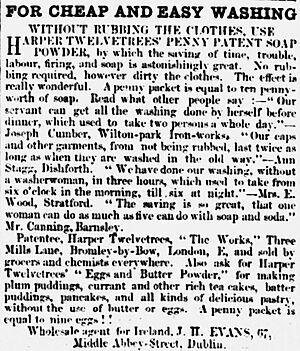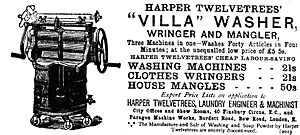Harper Twelvetrees facts for kids
Quick facts for kids
Harper Twelvetrees
|
|
|---|---|
| Born | 17 December 1823 |
| Died | 30 November 1881 (aged 57) |
| Nationality | British |
| Known for | Laundry cleansing products and washing machines Philanthropy Anti-slavery campaign |
| Spouse(s) | Mary Hubbard (1848) Isabella Noble (1851) |
| Children | William Harper, 1848 Walter Noble, 1852 Florence Rose, 1858 Edwin Harper, 1863 Herbert, 1866 |
Harper Twelvetrees (1823–1881) was a British businessman who made laundry products and washing machines. He was also known for his kindness and for fighting against slavery. He helped many people and made a big difference in his community.
Contents
Harper Twelvetrees' Life Story
Harper Twelvetrees was born on December 17, 1823, in Biggleswade, England. He was one of ten children. His father was a carpenter and builder.
Starting a Business
When he was 17, Harper Twelvetrees became an apprentice in Potton. He learned about printing and selling books. Soon, he started his own business in Dunstable. In 1848, he moved his business to Holborn. Here, he also began selling laundry supplies made by other companies. He was very interested in chemistry, which he had learned about during his apprenticeship.
In 1849, Harper Twelvetrees wrote a small book called The Science of Washing. In it, he shared his own recipe for a special cleaning paste. He said this paste would help families do their laundry quickly and cheaply every week. Before this, many families only did laundry once a month!
Growing the Business
In 1859, Twelvetrees moved his factory to Bromley-by-Bow. He called his new factory "Imperial Works." He quickly started advertising his products everywhere. His name even appeared in a famous Australian sea shanty (a sailor's song) in 1865!
His business grew steadily. By 1865, he sold many different products. These included shoe polish, inks, washing powder, soap, and even baking powder.
Washing Machines
Harper Twelvetrees then started making machines. He called himself a "Laundry Engineer." In the 1870s, his most famous machine was called the "Villa." Even Mrs. Beeton, a famous writer on household management, praised it. She said it was "excellent for family use" and "very easy to work."
At its busiest, his factory employed about 400 people. Harper Twelvetrees cared a lot about his workers. He built homes for them and their families. He also set up a system to help them if they got sick. There was even a club for clothes and a sports club. He also organized concerts and lectures for his employees. People praised his kindness. One newspaper said he should be remembered alongside other great humanitarians like Leverhulme and Rowntree.
Harper Twelvetrees faced challenges in his business, but he bravely started again in new premises. His friends and colleagues celebrated his return to business in 1869. They honored him for his efforts to improve the lives of working-class people.
Fighting Against Slavery
Harper Twelvetrees strongly disliked slavery. He became very involved in the case of John Anderson. John Anderson was an African-American man who escaped slavery and went to Canada. He faced legal trouble while on the run.
The case caused a lot of discussion in both Britain and America. When John Anderson came to London in 1861, Twelvetrees helped him. He organized a speaking tour across the country for Anderson. This helped raise money for Anderson's cause. Even Lord Shaftesbury, a famous British politician, supported them. Twelvetrees also wrote a book about John Anderson.
The case ended well. After his speaking tour, John Anderson spent a year studying with Twelvetrees' financial help. He was given land and free travel to the Republic of Liberia, where he sailed in 1862.
His Family Life
Harper Twelvetrees married Mary Hubbard in 1848. They had one child, William Harper. Sadly, Mary died in 1849.
In 1851, Harper Twelvetrees married Isabella Noble. They had four children together. Harper Twelvetrees passed away at his home in Clapton, on November 30, 1881.
Harper Twelvetrees used his business and kindness to make a big difference. He improved life for many people in east London. His fight against slavery also helped change public opinion during the American Civil War.
 | Anna J. Cooper |
 | Mary McLeod Bethune |
 | Lillie Mae Bradford |



